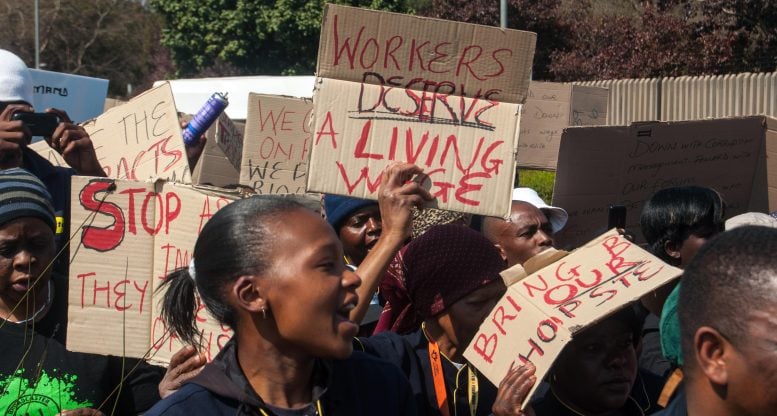
University of Johannesburg cleaners and other groups supporting the Persistent Solidarity Forum demonstrate for a fair wage for the workers. Credit: Meraj Chhaya (CC BY 2.0 Deed)
According to a recent report from Binghamton University, there is widespread disregard for worker rights on a global scale. The report ranks countries based on their adherence to human rights and highlights a decrease in labor rights protection despite economic globalization favoring corporations over workers' interests.
New research by Binghamton University faculty at the State University of New York reveals that worker rights are among the least protected human rights worldwide.
The findings are part of a new report published by the CIRIGHTS Data Project, the largest human rights dataset in the world. Since 1981, the project has ranked countries around the world based on their respect for human rights, providing an annual “report card” on 25 internationally recognized human rights. The project is co-led by Binghamton University Professor of Political Science David Cingranelli.
As per their latest report, featured in Human Rights Quarterly, Canada, Sweden, New Zealand, Norway, and Portugal hold the top five positions for overall scores, while Iran, Syria, North Korea, China, and Iraq have the lowest scores.
Research shows that worker rights, such as the right to join a trade union and engage in collective bargaining, are extremely underprotected. The researchers noted that worker rights are consistently violated in some capacity.
According to Cingranelli, previous studies indicate that governments are unlikely to safeguard rights such as a fair minimum wage, occupational health and safety, or reasonable work hours (including voluntary overtime) unless they allow workers to establish independent trade unions and engage in collective bargaining. In essence, the right to unionize, bargain, and strike serve as the gateway rights. If these rights are protected, other labor rights are likely to be protected as well. However, the global status of these gateway rights is declining.
Cignarelli pointed out that while democratic and wealthy nations offer more protection for labor rights than others, economic inequality has risen almost universally.
Cignarelli stated that economic globalization has intensified competition among nations, causing governments to prioritize corporations over workers in their conflicts.
Cignarelli highlighted that in the least economically developed countries, major agricultural, mining, and oil extraction companies have significant control over workers, similar to the early stages of industrialization in the United States.
He emphasized that companies and workers typically have conflicting views on how much attention corporate leaders should pay to workers' desires regarding their work terms and conditions. Corporate leaders primarily prefer to allocate most of the profits to shareholders rather than workers.
Stringent labor regulations in one country can prompt companies to relocate. Cignarelli stressed that it is the government's responsibility to ensure that workers have a fair opportunity to voice their concerns.
“If there are no government policies protecting workers, companies can do anything they want to prevent unions,” Cignarelli said.
Reference: Reference: “CIRIGHTS: Quantifying Respect for All Human Rights” by Skip Mark, Mikhail Filippov & David Cingranelli, 10 May 2024, Human Rights Quarterly.



